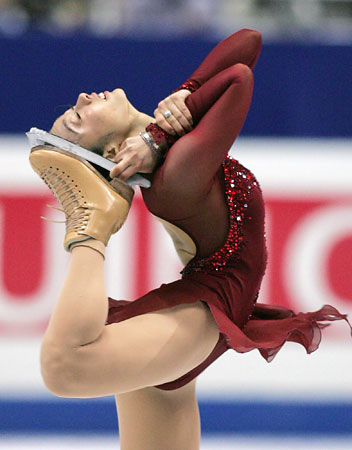
2007 World Skating Champion: Miki Ando
When you look around you and see talented people you may run into a common misconception.
You may believe that those considered ‘talented’ or ‘creative’ require less practice.
Makes sense, huh?
If you’re already talented, where’s the need for practice?
You already have what it takes.
Your brain is genetically engineered towards your talent.
You should be coasting downhill, while the others struggle.
Yet the evidence all around you, points to the exact opposite situation.
The top athletes in the world practice long hours.
The top artists in the world seem to be stuck to their palettes.
The best speakers go over their material, time after time, after time.
The best figure skaters do their routines hypnotically.
In fact, when research was done on the top figure skaters, here’s what the researchers found.
They found that the mark of the top skater is the ability to do their spins and jumps.
And that the absolute crème da la crème skaters did more jumps and spins, when practicing.
The researchers found that the slightly lower-ranked skaters did just a little less practice.
And took more breaks in between their jumps and spins.
Less practice, eh?
And yet we strongly believe that talent is inborn.
Because if talent were indeed inborn, then where’s the need to practice?
Where’s the need to do yet another jump and turn?
Surely even at the highest level of sport, one figure skater would be so overloaded with talent, that it would be impossible for others to catch up. Surely it would be impossible, no matter how many hours of practice their competition puts in.
Talent or creativity is the result of many, many hours of frustrating practice.
Because when we have courses, like say Article Writing for instance, I can tell you who’ll be the star of the course.
I can tell you within days of the course beginning, who’ll write better articles than anyone else.
I can tell you, even without knowing that person’s background, or capability, or any so-called talent.
I can tell you based on momentum.
The ones who consistently write better, faster, and with more panache are those who practice.
Day in, day out. Week in, week out.
The momentum builds on itself.
Suddenly patterns emerge.
Suddenly the achievement is higher.
Suddenly the pats on the back increase.
But is momentum alone enough to create a factor of skill?
Obviously not.
However, it is one of the most critical factors, as compared to everything else.
Because whom would you rather believe?
The perception of the average person on the street—who believes in inborn talent?
Or the figure skater doing yet one more practice jump and turn?
